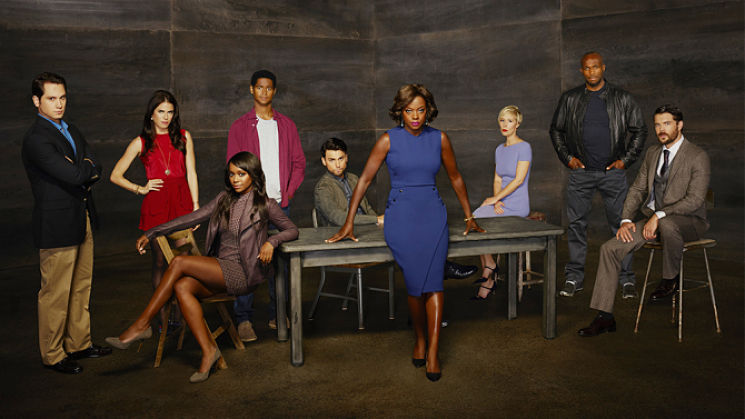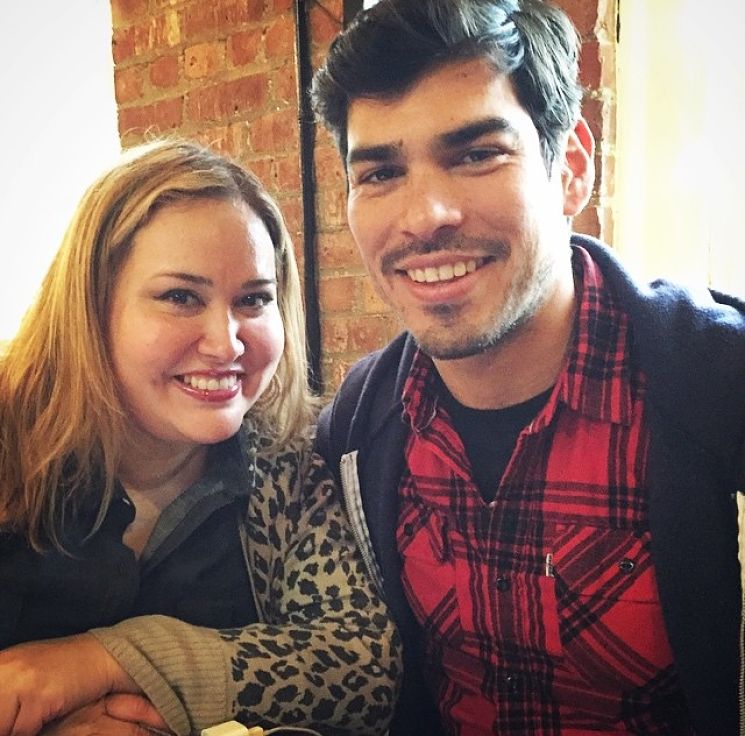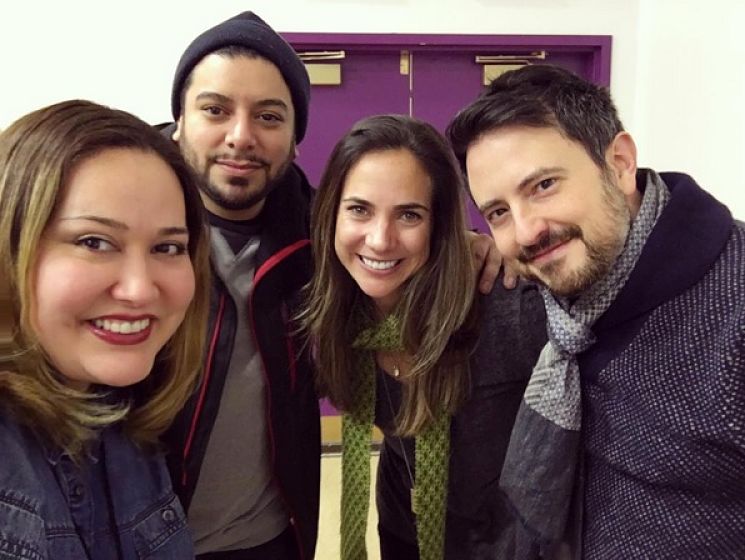In less than a decade, playwright Tanya Saracho has skyrocketed from Chicago storefront theatres to that city’s and the nation’s mainstages, and then quickly to a television career in Los Angeles, where her credits include “Devious Maids,” “Looking,” and the current Shonda Rhimes hit “How to Get Away With Murder.” Saracho’s recent stage credits have included The Tenth Muse at the Oregon Shakespeare Festival and Mala Hierba at New York City’s Second Stage Theatre. Currently running: Fade at Denver Center Theatre Company, Feb. 5-March 13.
It’s been a while since we spoke. You’re like a superstar now.
No, sir, that’s not true.
You’re doing well, though.
Doing well is different than being a superstar. I’m in a town full of superstars and I feel like such a hag. I mean, in L.A. you meet a 29-year-old who’s already had two development deals and is working on a movie, and you’re like: Why did I get started so late? I spend a lot of time thinking: God, I don’t get it! The inner monologue you have every day—that’s the exhausting part. I can see why people jump off bridges. That may sound extreme, but at the beginning, I was on the phone with my agent saying, “Get me off this show, get me on a plane back to Chicago, I’m the worst one here.” He had to play therapist for me. I was like, “I’m a fraud,” and he said, “Let me let you in on a secret: Everyone here has that fraud syndrome. Everyone. Just go back to work.”
There’s been a learning curve, obviously, but you seem to have picked it up quickly.
It’s like a video game: I achieved Level One, and there’s brrrring sound, and you get more guns—a little bit more in your armory. I’m well into Year Three. But it’s like, outlines still stress me out. I don’t write outlines when I write a play. I just light a candle, put on some incense and go! But first of all, you can’t have a candle in your office here, and also they’re like, “You have an hour!” I’m like, “But I need to pray to my muse…”

And everything has to be vetted at every stage. So I couldn’t see the alchemy here at first, like you have in the theatre, where something goes from words on the page and actors and designers take it and make it something onstage, and there’s a magic you can’t explain. But there is alchemy here too, especially in the reach. That was something I was not prepared for. It’s even more than film. Especially on “Looking,” where I had more agency to shape characters and I was on an episode—more people watched that one episode than have seen all my plays combined. Memes started happening, and it wasn’t just that there were memes; it was that people were listening. Suddenly you’re like, Oh, shoot, you have a responsibility in what you’re saying.
So are you a full-fledged Los Angeleno now?
Only this year did I finally move. I was in 13 sublets before that. I’d been in my apartment in Chicago for 17 years, and that’s longer than I lived in Mexico, longer than I lived in Texas. It was great, it had two bedrooms and a yard, and my “framily”—my friends family—are everything to me, especially because I don’t have a real relationship with my own family; we don’t speak. But it started to be more difficult to go back, especially this last job, which was 10 months here. It just didn’t make sense to keep two places.
What’s it like to work in the Shonda-verse?
One of my señora psychics—she’s actually an L.A. one, so she’s all hoity-toity with chakras—said that my next job would be like the Olympics. She said, “You won’t be able to split your mind. It will take all of you, body, mind, and soul.” And it has been true; I don’t understand anything about murder and law, and I’ve had to learn.
Meanwhile your play Fade is about to open in Denver.
Yeah, I was trying to go every weekend to rehearse that play, but I’ve had to work weekends on “Murder.” For the past year or so, I’ve been in a bad place with theatre; my fraud mentality has switched over to that. I’ve had productions in the past year or so that I didn’t think were all they could have been because I just wasn’t there. I feel like TV, the pacing and the scene length, has tainted my theatre stuff. I used to be all about stage directions, and I can’t do it anymore. I’ve been enveloped in this feeling of: I didn’t fulfill my promise that people pinned on me. I’m not the Great Brown Hope!

Other playwrights who have written for TV have sat me down and said, “This is the transition; you’ll feel all these things. You’ll muscle through it.” But I was feeling like: I could muscle through it, or I could just quit. Eight months ago, I was about to stop writing and give back the commissions. But now I’m okay. I’ve realized that the theatre has to be for me what it was at the beginning: It has to be about what I want to express, not about worrying whether that commission gets three productions, and is that theatre going to do my play? Theatre has to go back into my heart.
I had started to believe the hype, not about my own work but just about how you’re supposed to do it. I got to know a lot of New York playwrights, and they’re always all stressed out; I got stressed along with them and jumped on the wave, and the New York thing infected me in a weird way. Now when I talk to them, it’s all about who got what production where. I got lost in that for a while, and then I came here to L.A. So I’ve got to go reset back to that Tanya I was, which was Chicago storefront Tanya.
How would you compare theatre and television as places to work?
I’m a little disappointed in the theatre. We have the right terminology, the jargon, the talk in the theatre; I’ve been in all these think pieces, on all these panels, where we say the right things about gender and that word I hate, diversity, and we feel good about it. But it doesn’t show up in the seasons or on our stages. It just doesn’t. Working in TV, they don’t have the right terminology; they don’t even understand they have a problem. But people are buying this new stuff, and they know they need another point of view; they’re like, “We don’t know how to reach this community,” so they’re hiring people like me. They’re putting their money where their mouth is not. I mean, they’re saying all kinds of crazy things to me where I’m like, You can’t say that! Whereas in the theatre we have the right terminology, but nothing changes. We’re very learned people in the theatre; we value words. We get on panels. We chat. But there’s less money in the theatre, so every show has to be a sure bet. In TV it’s all about: Well, they’re buying it, so let’s make it.

Tell me about Fade; the premise sounds a bit autobiographical.
I wrote it as therapy my first year here. I was supposed to be writing about Lupe Velez, the Mexican stage star, and she just wasn’t speaking to me—and if I don’t hear the voice, I can’t write it. I was at a Center Theatre Group writers workshop, and I wouldn’t bring in pages; I’d just come in and complain about my day job writing for TV. Finally someone in the workshop said, “Just write about that!” So Fade is about a Latina who’s a first-year TV writer, originally from Mexico, and the janitor at the studio, who’s the only other Latino she sees there. They have conversations about race and gender; they’re both working for a big, oppressive system, but one of them has more power. She then ends up using his story without even meaning to.
How much of it is based on reality?
It starts out based on my experience, but then it becomes fiction. I didn’t ever kiss my janitor.
I’m curious, where in L.A. did you end up?
I’m near Melrose and Fairfax. Very central, and flat, which I need, coming from Chicago. I started dating a white man from Scotland—I’ve never dated a white person before—and he came to visit me and insisted on taking mass transit, which he hated. I told him that nobody does that, he should just take Uber, but he would never do that; he’s such a socialist he wouldn’t even use my microwave.
Well, I used to take the mass transit there, and it is terrible, but I was trying to pretend it was a real city.
It’s not, it’s lots of little cities that makes one big sort of monster city.
I lived in Echo Park most of my years there, but mostly before it got so gentrified.
I looked at Silverlake, but it’s way too trendy; everyone’s 98 pounds and it’s all hipsters. I feel really weird there. This feels okay where I am. I’m in one of those late 1920s apartments. I am trying to love it. But I’m too emotionally connected to Chicago still. Last time I went to Chicago, I stayed in a hotel and that hurt my heart. I’m trying to be a grownup.
I guess I thought—hoped?—that you and L.A. would embrace each other, because it’s such a Latino city.
Not in my TV job, or in most of the other spaces I’m currently at. I spend so much time in the industry. When you go into these meetings, there’s still a bit of: Am I going to have to shuffle my feet? You still a feel a little bit like a monkey in a box. When I do meet with executives of color, it’s like, “Ooh, let’s take off our belts and talk for real.” They’ll say, “Oh my God, I’m the only one here,” and we’ll be like, “This is crazy, let’s do something about this!” I just read that Charise Castro Smith has an order for her pilot, and Robert Aguirre-Sacasa has a pilot.
What about you?
Well, I sold Mala Hierba to HBO and I’m waiting to hear. I’ve done all the rewrites, now we’re going to see whether they’re going to make it into a pilot. And I’m not returning to the second season of “How to Get Away With Murder.” It was a hard decision to make, but I feel like I want to go and search for something more quiet and charactery. I have some offers coming, and I should finish some plays that I owe.
I know some playwrights who, as much as they enjoy their TV work, think of it as subsidizing their playwriting.
That’s what I’m trying to get to. For a while I was living two lives—I had two cars, two apartments—so I didn’t save. But now I am. I don’t have to work for the next four months. I’ve developed these new muscles, but now let me go back to my original thing and see if I can write six-page scenes like I used to. I need to just refind myself in the theatre. Who am I in relation to the stories?
Do you have any writing rituals?
I always work with the color orange. In chakras, orange is the color of creativity and sexuality. So I light an orange candle for writing; it’s like an offering. I’ve also been working with Archangel Uriel. I discovered him through a yawn, and just felt: Oh my God, you’re there! Now I do a meditation to yawn for real.
I have a room that’s just an altar. Right now the candle that’s burning is St. Jude–it’s literally on top of the printed play. I’m very superstitious.
I sort of knew that about you—I mean, I saw Enfrascada—but I was hesitant to use the word “superstitious,” as it might sound pejorative.
It’s okay. I’m a believer.
Finally: What TV do you recommend?
Have you been watching “Flesh and Bone”? It’s on Starz. It’s dark but if you’re in the arts, it’s interesting—there’s a crazy artistic director in it and big personalities. But it’s gritty. There are all these shows with interesting women—“Unreal,” “Jessica Jones”—and they’re all from female showrunners who are like, “The female gaze? Fuck you. It’s not as pretty as you thought.”


